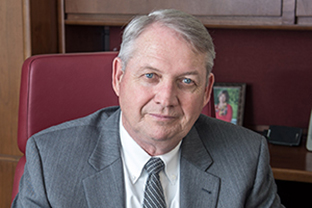June 2, 2020
Responding to racism, elevating equity and justice
 Dear university community,
Dear university community,
Like many of you, I have watched the death of George Floyd at the hands of a Minneapolis police officer and the community reactions across the country. I have struggled to find the words to express my feelings. I am appalled at his death and the deaths and mistreatment of other people of color due to racism and hatred. As a former police officer, as a former professor of criminal justice, as a university president, and as a human being, it angers me.
Let me be clear: racism has no place at our university. It cannot and will not be tolerated. We can and must do more on our campus and in our communities to create justice and equity for all, and especially for those who have been disenfranchised.
These issues are deeply personal to me and have guided my life’s work. The late Martin Luther King Jr. said that “a riot is the language of the unheard.” Growing up in a diverse, working-class neighborhood in Detroit, I watched the famed 1967 riots outside our family’s living room window. To this day, the scenes are etched into my memory. The dry cleaning business that sponsored my Little League baseball team was among those vandalized. I watched as the fabric of my neighborhood was shredded. Those silenced voices unleashed in a scream. We see that again today.
Not too long thereafter, I chose to pursue a career in law enforcement. I joined the Detroit Police Department. In 1967, the city had only about 50 African-American police officers. Fifty in a city of more than 1.5 million people. It is no wonder why the cries of the oppressed went unheard. More than 50 years later, the wounds exposed in 1967 are still not fully healed in our community. In my most discouraging moments, I wonder if they have healed at all.
I know what it means to work in a community whose residents feel that the application of law and order is anything but equal. When the police arrive in their neighborhood, the residents do not feel “protected” or “served,” they feel fear. That fear is justified by too many examples of mistreatment and worse. When I joined SVSU to teach criminal justice, it was because I wanted to prepare men and women for the challenges of law enforcement and to teach them that everyone deserves justice. This justice was denied to George Floyd and too many others like him.
We have worked hard to create an inclusive environment and a culture at SVSU where diversity training and education are available and encouraged, and where there is zero tolerance for racism and discrimination. We must do more. We cannot be bystanders. We cannot wait for change. We must initiate change.
I will appoint a task force of faculty, staff and community members to further elevate equity and justice within SVSU, especially for those who are marginalized, and to provide recommendations for how we can extend those efforts into our surrounding community. Our university values of diversity and inclusivity and a safe, friendly and respectful campus climate support this important work. Please watch for more information on this in the coming days.
Finally, if you have been silent about an issue of racism or intolerance within SVSU, I want to hear from you. I want your voice to be heard. Please e-mail me at presidentsoffice@svsu.edu.
These challenges are even more difficult during a global pandemic that prevents us from gathering on campus, but we cannot allow that to be an excuse for indifference or inaction. I implore each member of our Cardinal family to step up and join in the cause of moving our university and our community toward the ideals on which our nation was founded.
Sincerely,
Donald J. Bachand, President
